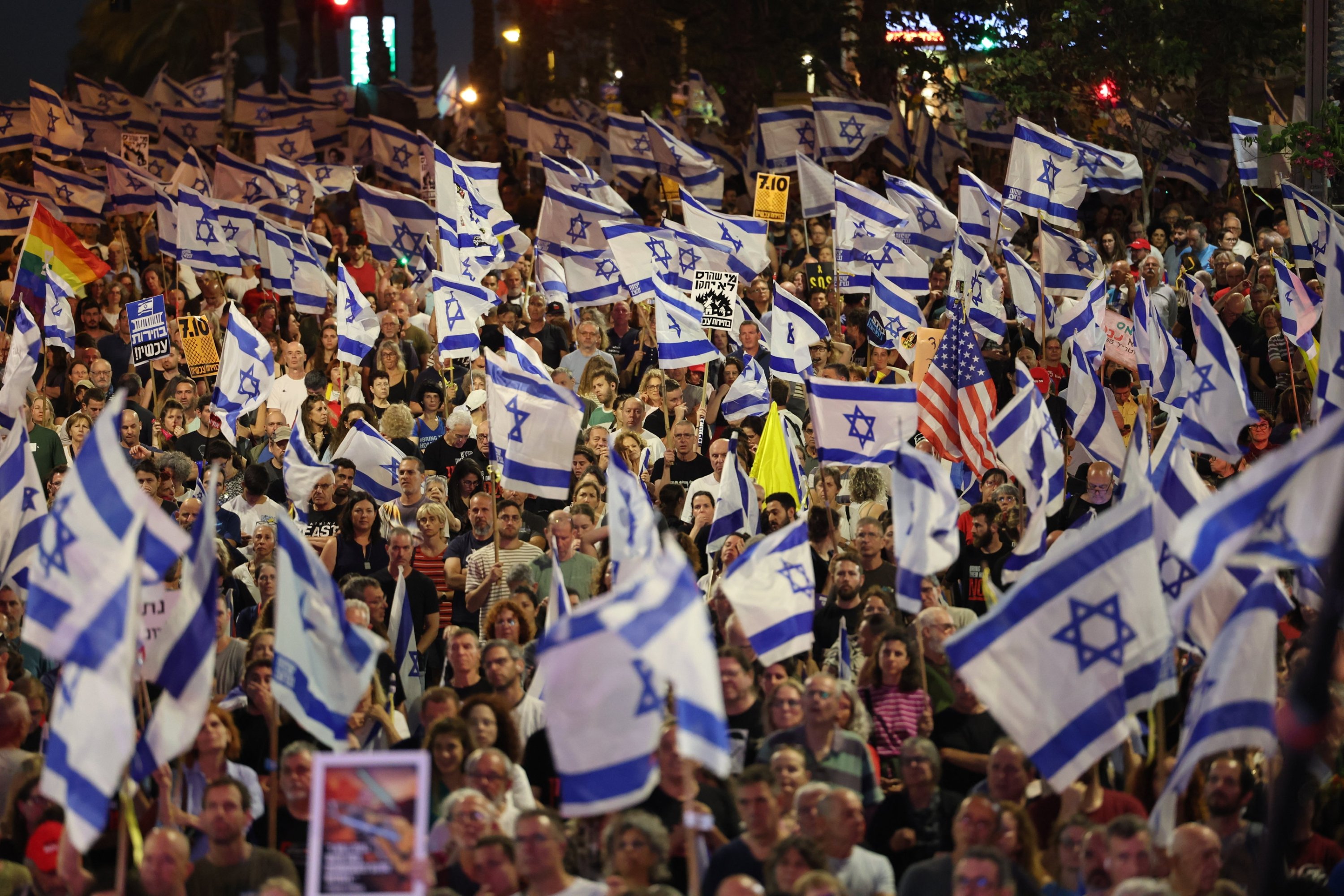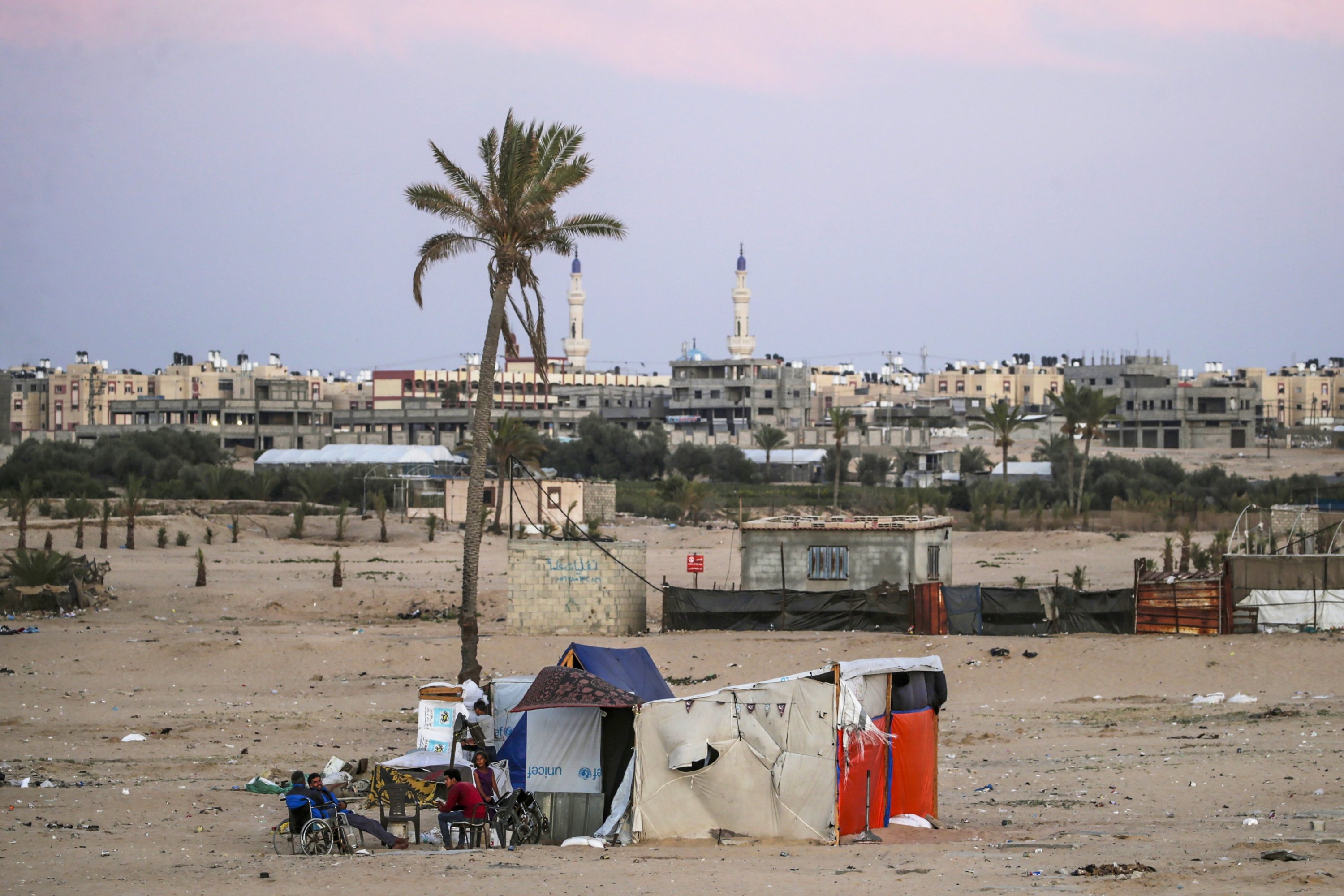Prime Minister Benjamin Netanyahu, however, has insisted Israel will pursue its brutal war, raging since Oct. 7, until it has destroyed Hamas and freed the captives.
Netanyahu, a hawkish political veteran leading a fragile right-wing coalition government, is under intense domestic pressure from two sides.
Protesters supporting the hostages, who rallied again in their tens of thousands in Tel Aviv on Saturday, are urging him to strike a truce deal – but right-wing extremist allies are threatening to bring down the government if he does.
Opposition leader Yair Lapid has offered Netanyahu a lifeline by vowing to support the government if it strikes a deal to pause the war that has raged for almost eight months.
For now, bombardment again rocked Gaza overnight and Sunday, with the military reporting more airstrikes and ground combat and Palestinian officials reporting yet more deaths.
Netanyahu said Saturday that “Israel’s conditions for ending the war have not changed: the destruction of Hamas’s military and governing capabilities, the freeing of all hostages and ensuring that Gaza no longer poses a threat to Israel.”
Palestinian resistance group Hamas, meanwhile, said it “views positively” what Biden on Friday described as the Israeli plan.
Mediators in the United States, Qatar and Egypt on Saturday said they “call on both Hamas and Israel to finalize the agreement embodying the principles outlined by President Joe Biden.”

Political pressure
Biden said Friday that Israel’s three-stage offer would begin with a six-week initial phase that would see Israeli forces withdraw from all populated areas of the Gaza Strip.
It would see the “release of a number of hostages” in exchange for “hundreds of Palestinian prisoners” held in Israeli jails.
Israel and the Palestinians would then negotiate for a lasting cease-fire, with the truce to continue so long as talks are ongoing, Biden said.
“It’s time for this war to end, for the day after to begin,” he said.
Netanyahu took issue with Biden’s presentation, insisting that according to the “exact outline proposed by Israel” the transition from one stage to the next was “conditional” and crafted to allow it to maintain its war aims.
Finance Minister Bezalel Smotrich and National Security Minister Itamar Ben Gvir, leaders of the two extreme-right parties in parliament, quickly warned they would leave the government if it endorsed the truce proposal.
Ben Gvir said on X his party would “dissolve the government,” while Smotrich said: “We demand the continuation of the war until Hamas is destroyed and all hostages return.”
Smotrich said he also opposed the return of displaced Gazans to the territory’s north and the “wholesale release …” in a prisoner swap.
Lapid, a centrist former premier, however, said that the government “cannot ignore Biden’s important speech” and should accept the proposed deal, vowing to back Netanyahu if his far-right coalition partners quit over it.
“I remind Netanyahu that he has our safety net for a hostage deal,” Lapid said on social media site X.
Israel’s President Isaac Herzog said Sunday he had told Netanyahu “that I will give him and the government my full support for a deal which will see the release of the hostages.”
“It is our inherent obligation to bring them home within the framework of a deal that preserves the security interests of the State of Israel,” Herzog said in an address at the Hebrew University of Jerusalem.
Helicopter strikes
The conflict was triggered by the Oct. 7 Hamas incursion, which resulted in the death of more than 1,170 people in Israel, according to an AFP tally based on official Israeli figures.
Out of 252 people taken hostage that day, 128 are still being held inside the Gaza Strip, including at least 37 who the army says are dead.
Israel has killed over 36,379 Palestinians, mostly women and children, in the Gaza Strip since, according to the Gazan Health Ministry
Heavy fighting has flared in far-southern Rafah, where Israel sent tanks and troops in early May, ignoring concerns for displaced civilians sheltering in the city.
Israeli Apache attack helicopters on Sunday opened fire on targets in central Rafah, a jet fired a missile at a house in the western Tel al-Sultan district and artillery shelling targeted the southern Brazil neighborhood, witnesses said.
Elsewhere in Gaza, Israeli helicopters fired at targets in Gaza City’s Zeitun and Sabra areas, and an air strike hit a house in the city’s east, AFP reporters said.
Three people were killed including a woman and a child when an air strike hit a family apartment in Gaza City’s Daraj neighborhood, a hospital medic said.

and Egypt in Rafah, southern Gaza, May 31, 2024. (EPA Photo)
Artillery shelling also targeted areas of Deir al-Balah and the Bureij and Nuseirat camps, witnesses said.
Before the Rafah offensive began on May 7, the United Nations said up to 1.4 million people were sheltering there. Since then, one million have fled the area, the U.N. agency for Palestinian refugees, UNRWA, has said.
The Israeli seizure of the Rafah crossing has further slowed sporadic aid deliveries for Gaza’s 2.4 million people and effectively shuttered the territory’s main exit point.
Egyptian state-linked Al-Qahera News said Cairo will host a meeting with Israeli and U.S. officials on Sunday to discuss reopening the Rafah crossing.
Israel’s Defense Ministry body overseeing civilian affairs in the Palestinian territories, COGAT, also said that 764 Egyptian trucks had crossed into Gaza over the past week through Israel’s Kerem Shalom crossing
Source:dailysabah.com
